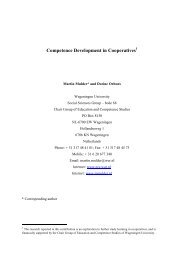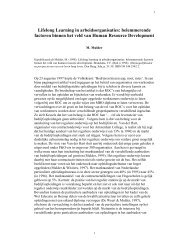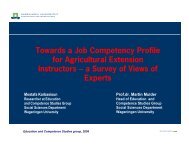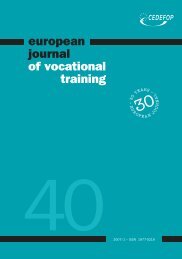The concept of competence: blessing or curse? - Martin Mulder, PhD
The concept of competence: blessing or curse? - Martin Mulder, PhD
The concept of competence: blessing or curse? - Martin Mulder, PhD
- No tags were found...
Create successful ePaper yourself
Turn your PDF publications into a flip-book with our unique Google optimized e-Paper software.
domains, such as higher and selection, assessment and reward systems, and training anddevelopment. Competence pr<strong>of</strong>iling is an art in itself. Various <strong>or</strong>ganisations have developedgeneric <strong>competence</strong> framew<strong>or</strong>ks (e.g. Bartram, 2005). Examples <strong>of</strong> recent <strong>competence</strong>pr<strong>of</strong>ile development studies can be found in Lans (2009) f<strong>or</strong> entrepreneurial <strong>competence</strong>,Du Chatenier (2009) f<strong>or</strong> open innovation <strong>competence</strong>, and Karbasioun (2007) f<strong>or</strong> extension.<strong>The</strong> big advantage <strong>of</strong> have <strong>competence</strong> pr<strong>of</strong>iles as a basis f<strong>or</strong> human resource managementis that the various HR instruments which traditionally are being used by different categ<strong>or</strong>ies<strong>of</strong> pr<strong>of</strong>essionals (such as in selection, direct supervision and training) can be better aligned.Competence-based vocational educationAs mentioned above, there are strong advocates <strong>of</strong> the <strong>competence</strong>-based vocationaleducation philosophy, whereas there are also strong critics. Those who are in favour <strong>of</strong> thisphilosophy tend to point at the benefits f<strong>or</strong> the linkage <strong>of</strong> educational programs and labourmarket needs, the increased relevance <strong>of</strong> education and training, the transversal nature <strong>of</strong><strong>competence</strong>s, the added value <strong>of</strong> learning to apply knowledge and skills in practice, and theinclusion <strong>of</strong> the affective domain and emotions.In many countries there are now <strong>competence</strong>-(<strong>or</strong> outcome-)based qualification structures.Educational institutions however have been and are still struggling with the translation <strong>of</strong>these qualifications structures in day-to-day education. Crucial planning levels in thisprocess are the institution curricula and courses. Staff <strong>of</strong> educational institutions areexpected to make the translation <strong>of</strong> the national framew<strong>or</strong>ks to the institution’s programsat various levels. This is by no means easy to say the least. Furtherm<strong>or</strong>e, pressure on<strong>or</strong>ganisations and educational staff is high and the risk is that stakeholders involved claimthat they are implementing <strong>competence</strong>-based education whereas that implementationmay be only at the surface level, <strong>or</strong> even w<strong>or</strong>se, management and staff merely pay lipserviceto the implementation <strong>of</strong> this educational philosophy.To supp<strong>or</strong>t the development and implementation process <strong>of</strong> <strong>competence</strong>-based educationwe developed a so-called matrix <strong>of</strong> <strong>competence</strong>-based education, which can be used toassess the actual level implementation <strong>of</strong> certain principles <strong>of</strong> <strong>competence</strong>-based educationand to decide on the ambitions regarding further <strong>or</strong> deeper implementation. We started tocall this the measurement <strong>of</strong> the ‘competentiveness’ <strong>of</strong> educational programs, with whichwe mean the extent to which educational programs comply with, <strong>or</strong>iginally eight (Wesselink,2010) but now, ten principles <strong>of</strong> <strong>competence</strong>-based vocational education (Sturing, op cit).<strong>The</strong> ten current principles <strong>of</strong> <strong>competence</strong>-based vocational education which emerged fromvarious the<strong>or</strong>etical and empirical studies are rew<strong>or</strong>ked into the following list (after Sturing,op cit):12 | P a g e







